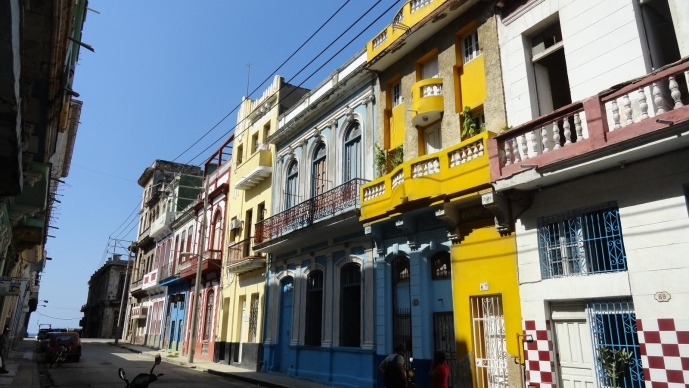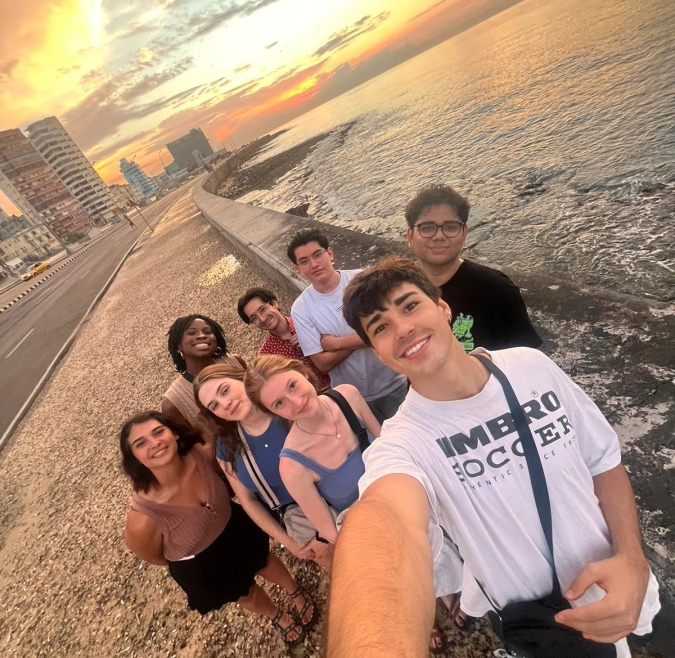Winter: USAC in Havana (Cuba)
The Program
Study for three weeks at The Instituto de Filosofía in La Habana, Cuba.
Students will study the impact of African, Spanish, and American influences on Cuban Culture and Society, as well as embarking on field trips to significant surrounding areas of the country. Excursions include walking tours, museum visits, and guest lectures coupled with cultural activities and meals to provide you the opportunity to interact with Cubans and learn firsthand their perspective of our common histories. Individual courses have field trips, performances, or outings built in to complement what you explore in class. You’ll also visit a tobacco plantation, cigar factory, and a beach resort to experience the full range of Cuba’s agricultural history and present tourism economies.

Program Location

Havana
Havana (La Habana), the capital of Cuba, is a bustling city full of culture, arts, and entertainment. Old Habana is a UNESCO World Heritage site and is one of the best-preserved colonial Spanish complexes in the Americas. With a population of 2.1 million, Havana is the 7th largest city in North America. Students will find that Havana is full of color, with salsa music, parties, and open-air bazaars. There are many landmarks to explore in Havana, including Fusterlandia, El Moro, Gran Teatro de la Habana, and the Hemingway Museum. The friendly and multicultural Cuban society supports a rich and varied Caribbean culture that is a fusion of African, Spanish, and American influences. Cuban music, dance, literature, cuisine, and art all reflect this historical and cultural mixture resulting in a sensory overload of exotic rhythms, vibrant colors, and tropical flavors. Cuba's natural beauty is as unique as its culture, with agricultural valleys and plains and thousands of miles of shoreline and pristine beaches.
Academics
To view the list of courses available for the Winter 2026 session, please click here. To request a course syllabus, email syllabus@usac.edu
This program is great for students enrolled in the Department of Women’s and Gender Studies, and Spanish, History/Political Science, Sociology, Anthropology, and Latino & Caribbean Studies majors. Students will take courses at The Instituto de Filosofía in La Habana. Founded in 1968 and maintains close ties with the Universidad de la Habana and other universities in the country, the US, Europe, and Latin America. Students can take courses from a wide range of academic subjects, from Cuban Cuisine, to History, Politics, Dance, and Spanish.
Students will enroll in three to four credits; at least one 3-credit course is required. Courses are taught in English unless otherwise noted in Spanish. Courses taught in Spanish are typically intended for students with four or more semesters of college Spanish. Courses are subject to minor changes resulting from on-going curricular review, faculty assignments, and program revisions. Course availability is conditional on student interest and enrollment.
To learn more about the host university in La Habana, click here.
For information about study abroad credit transfer, registration, and transcripts please visit the Academic Planning section of our website.
Watch a student-made video about their experience in 2018 https://www.youtube.com/watch?v=GPBr3AGuVI0
Housing and Meals, Passport and Visa Requirements
Homestay
For your time in Cuba, you will stay in bed-and-breakfast style apartments, run by local Cuban families, near the Instituto de Filosofia in a student neighborhood. This style of accommodation is relatively new in Cuba and it provides you with an authentic Cuban family experience. The area is only a five minute taxi ride to Habana Vieja (the popular, touristy part of La Habana). The Vedado neighborhood is far less touristy than Habana Vieja and offers a more authentic experience; it is also close to the recently opened American embassy. You will stay in double rooms, and there will be a few students in each apartment. There will be a common living space and kitchen so you can spend time with and communicate with your host family. Daily breakfast will be provided by the landlady of the apartments.
Click here to visit USAC's Living Accommodations page, which includes more information and photos!
For information about passport and visa requirements, visit https://usac.edu/study-abroad-programs/cuba/passport-and-visa
Financial Information
Program Costs
| NJ Resident | non-NJ Resident | |
|---|---|---|
| Program Cost for Undergrad | $6,500 | $6,960 |
Program Cost includes:
• Tuition
• Housing
• Breakfast
• Administrative Fees
• Emergency Medical Access Abroad
* The winter session student fee is not included in the program cost above.
Out-of-Pocket Costs
| Airfare | $1,000 |
| Meals | $450 |
| Local Transportation | $30 |
| Personal Expenses | $350 |
| *USAC Application Fee | $100 |
| Total | $1,930.00 |
Out-of-Pocket Cost includes:
The above costs are estimations and represent the known out-of-pocket costs students encounter during their time abroad.
Some of these expenses will be paid for prior to going abroad, such as an airline ticket and visa costs, while some of these expenses, such as meals and local transportation, will be paid in-country as part of your daily expenses. As you plan, you will need to budget these costs and spend wisely throughout your time abroad.
*The $100 non-refundable USAC application fee you paid USAC has already been deducted from the program cost.
